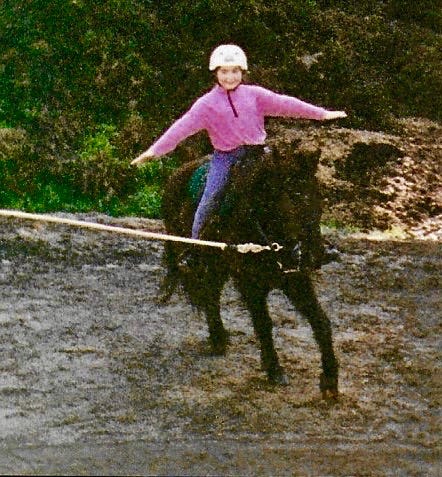Home School: Safety and Inspiration
Once illegal, parents are now free to homeschool their children. Charter schools and religious programs proliferate, but non-schooling, free-range homeschool still exists. Here's one success story.

Chaos at School
Watching my grandson stack and line up a bunch of magnetic blocks I'd purchased at a local store, I tried to show him something he could do with them. In his usual manner, he screamed and waved his arms, collapsing to the floor for a full-blown meltdown. I then remembered what his father had said to my daughter, Val, whenever she interfered with something he was trying to do. "Get out of my business, devil woman!"
At first I was shocked. Over time I learned this was an in-joke between them that we soon realized also concerned her son. Then she confessed. "I'm the same way, Mom. When I was a kid, I hated people telling me how to do things."
Ah yes, I remember now. And it was one reason why Val did well with home school even though she also succeeded in school academics. It was other stuff that sabotaged her elementary education.
Kindergarten, first, and second grades went well. I thought her teachers were geniuses: creative, fun, and welcoming to a parent who wanted to help in class. Something changed in third grade.
For one thing, her kindergarten teacher wanted to try third grade. Total disaster! Not only did her obedient little learners become demons from Hell over the previous summer, she kept her kindergarten rhythm of breaking activities into 15-minute segments. Third graders have a longer attention span. They need time to get immersed in the subject and process the information. Projects were rushed and brushed off as she checked off the curriculum boxes. She seemed pressed to account for all the state-required curriculum points each day.
The children grew restless with such a schedule. Also, there were seven boys who were naturally unruly, bursting with boy energy that was poorly channeled in this rapid-fire environment. That was a third of the class. The teacher's positive reinforcement tactics totally backfired. When the other kids saw how the rowdy boys were given special privileges, such as more computer use and reading time, they started acting up too. Chaos ruled the day!
The teacher also rewarded good behavior with candy. Val gained thirty pounds and suffered bullying this teacher ignored. Val had met with violent situations, including a threat from a parent with whom we'd had a falling-out. Judging by Val’s listless behavior, we saw she was going down fast and needed a place of safety before she turned off completely. When she confessed she hated reading, that was it. Time to leave the system before it was too late.

We enrolled her in a local home school program that was in its infancy, but ultimately developed into a charter school through the district. Its philosophy followed John Holt's non-schooling method of allowing children to follow their own interests. The parents, guided by four experienced teacher/mentors, could incorporate any activity to foster reading, writing, math, physical education, social studies, etc. They stated that normal family life was a fertile ground for inspiring academic lessons. Doing household chores, going shopping, and helping with yard work and maintenance added concrete lessons in organization, math, science, and teamwork.
Learning how to make her bed resulted in a personal coup when she attended Space Camp. She was the only one who knew how to put the sheets on her bunk among the sixth grade girls who shared her room. Maybe it led to the mean girl struggle she endured through that week, but that was another hurdle she surpassed.
Credentials and Variety
I had already met Betty Watson and Estelle Fine, who held gatherings for homeschoolers in their home. Val enjoyed attending these. Further investigation into how their program worked convinced me to enroll her.
The four support teachers were experienced licensed classroom instructors who had also homeschooled their own children. Their program enriched dozens of students in our rural community. Of ninety children enrolled, twenty-five took advantage of short classes, special events, and field trips that ranged from music, storytelling, pottery, circus skills, science, and math; often connecting them with community artisans. I still have the pottery pieces she made in one class: a couple of bowls and a mask of a wolf. A holiday concert showcased students’ talents, giving Val an opportunity to play her guitar.
Magic Happened
The class that turned Val around was horseback riding. Assigned to a Shetland pony named Flip, Val learned basic riding skills. I was thrilled to see that huge grin return as she balanced on Flip’s bare back, holding her arms and legs outward as Kelly Reno had done in The Black Stallion.
Magic happened on that scrappy pony. She fell in love with horses. During a road trip, we discovered the Riding Academy books in a bookstore. It would be a long drive back home, so Val used that time to read the entire book. She could hardly wait to buy the next book in the series. Then she devoured other horse books, both fiction and non-fiction. We also augmented with the Four H horse program. I didn’t need to force her to read now.
When we started, I told Val to "put her eyes on the printed page every day, even a Golden book would do." I failed to have her read aloud to me, though. That would have assured me at least that she was actually reading and not just looking at the page to appease me. (There are lessons for parents in home schooling, too.)
Later we had sessions where I read Secret Garden, Heidi, Black Beauty, and Hans Christian Anderson's The Little Mermaid to her. Then we would watch the movie and discuss differences in how each format treated the story. We were lucky to find current videos for each book. When she talked to a friend who was star-struck with Disney's Little Mermaid, Val told her Anderson's ending from the book and how it differed from the Disney version. She was beginning to put it all together.
The Result
The biggest benefit from home school was the ability to guide her own learning. Her Home School’s philosophy was to encourage children to follow their interests and learn at their own speed. This suited Val's learning style and also helped cement her self-discipline.
Her first grade teacher had told me at our parent-teacher conference that Val had trouble finishing tasks in the allotted time in class. Then she realized Val spent time organizing her materials before jumping headlong into the project. She was giving it a lot of thought before starting to work on it. At least that teacher understood what was going on. I wonder if other teachers would have marked it as a failing.
Using the non-schooling method, we were told it takes a few months for a child to detox from the school experience and learn how to guide her own process. You might even call it "free-range" learning, the natural process children use right from toddlerhood. As toddlers, they love to explore their world, bumping around in a seemingly haphazard way, testing the boundaries as they learn how objects and parental input works. When they enter a traditional school, they slam into rigorous standards, rote lessons, and impatient teachers who have a schedule and tedious requirements to meet. Everyone eventually becomes stressed out from this unnatural regimen. Teachers have complained to me that they had no time for storytelling!
Eventually, Val returned to school for 9-12th grades, earning National Merit certificates every semester. She graduated a semester early and took a job at a local retail store to prepare for college. Her work life has benefitted from the skills she gleaned from home school which enabled her to devise the structure of her present job as a coordinator between medical, social, and law enforcement stakeholders in rural counties. There was no job description when she started that job. She had to hit the ground running and explore the needs and resources of each community with only a rudimentary list of contacts. Would a student from a more traditional educational experience succeed if dropped into this "fly-by-the-seat-of-your-pants" challenge?
A few years ago, Val phoned a classmate from third grade. When she hung up, she said, “Mom, I’m really glad we did home school or I would have become just as jaded as Lena.”
Now, as we watch her son discover his world with a "get out of my business" attitude, we know he'll be the perfect candidate for a non-schooling experience. He's already doing it as a toddler. Why not continue that process as he matures?
photos by Sue Cauhape unless otherwise stated.
If you enjoyed this essay, feel free to explore other essays, poems, and stories in the Ring Around the Basin Archives. Also, I love to read your comments, so please share your thoughts. Let’s start a conversation. And thank you to all of my subscribers for supporting my work.
Ghost in the Forest, available in paperback and Kindle versions on Amazon.
Book Review:
"Ghost in The Forest" is a great read! Take note People. If you love stories about environmentalism and nature, its clash with urban mindsets, as well as personal transformation, this is the book for you!






Very inspiring, Sue. I learned a lot here - gained a new perspective. Thank you.
Horseback riding has been a game changer for my granddaughter. As well as being flexible with the schooling